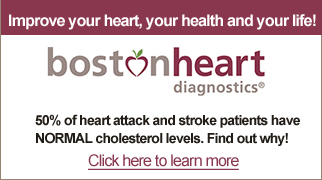Wellness: It's Your ChoiceWhy is Plaque Important?
Plaque (atherosclerosis or hardening of the arteries) is a disease in the wall of arteries. It is an inflammatory process in which cholesterol from the blood is deposited in artery walls, resulting in plaque formation. Think of plaque as a pimple containing liquid fat. Vascular disease is directly linked with an individual's genetics, lifestyle, inflammation and circulating blood lipids (fats). Without warning, the capsule covering of the plaque can rupture allowing the fatty cholesterol deposits to escape causing a blood clot at the ruptured site. If the clot closes off the entire artery, a heart attack or a stroke results and emergent medical attention is required to remove the clot, if possible. The size of the clot, its location within the artery and where it travels determines the severity of a stroke or heart attack, and whether or not it is fatal. Plaque can grow slowly, rapidly, or remain stable and never cause an event, unless it ruptures. What is now understood is that plaque at any stage of narrowing (stenosis) can become unstable and rupture. In other words, it is NOT plaque clogging the arterial pipe that is the primary problem, it is the inflammation and rupture of the plaque. The good news is that the inflammatory disease process of atherosclerosis formation is potentially reversible and even preventable! The KEY: identifying those patients who do not know they have disease (plaque) BEFORE they ever have a cardio-vascular (C-V) event. Preventing a Future Heart Attack or Stroke
C-V prevention recommendations are based on a patients' risk assessment for having a future heart attack or stroke. Risk classifications are an educated guess based on personal and family health histories and a basic cholesterol panel. Personal risk factors include age, current smoker, high blood pressure, waist measurement, diabetes, low HDL-C, high LDL-C, high triglyceride. Family history of early heart attacks and stroke and genetics are known potentially inherited risks. High-Risk includes anyone that has had a prior heart attack or stroke. Low-Risk patients frequently have 'normal' cholesterol levels and no risk factors. Yet they may still have a heart attack or stroke. How many times have you heard about someone who is the epitome of 'good' health, exercises regularly, eats right, doesn't smoke, etc. and has a sudden heart attack. How can that happen? Answer: unknown and untreated arterial plaque that suddenly ruptures. Risk lowering recommendations are generally referred to as either Primary or Secondary. Secondary Prevention recommendations (prevention of having another heart attack or stroke) are the standard for high-risk patients. These patients are treated more aggressively. Primary Prevention (prevention of ever having a heart attack or stroke) is recommended for low-risk patients and is approached with less 'aggressiveness'. All patients are encouraged to eat healthy, lose weight (if not optimal), exercise regularly, not to smoke, monitor their blood pressure and learn to manage stress. All these risk factors can be successfully modified when patient education, motivation, lifestyle plan and coaching are provided. The problem with this dual standard of care is the fact that nearly 50% of patients who have their first C-V event fall into the low risk category. Clearly, in hindsight these patients had undiagnosed disease and were misclassified and therefore, mismanaged. Additionally, in patients who have been diagnosed with mild atherosclerosis (plaque) in their arteries are frequently told that 'plaque is normal as they age' and 'not to worry', unless it progresses, causing serious blockage to blood flow (to the brain or heart). Even reports from mobile vascular ultrasound screening services state, "mild plaque is normal". This is like telling a woman she is a 'little bit' pregnant. She is or she isn't. This 'not to worry' belief is a leftover from the 1970's 'clogged pipe mentality' regarding arterial vascular disease, cholesterol, plaque and the cause of C-V events. (http://circoutcomes.ahajournals.org/content/6/1/129.extract) Dr. Benz believes we should not rely only upon risk factors and cholesterol levels for predicting the likelihood of a vascular event. She utilizes Doppler vascular ultrasound to 'look for' disease that may progress and eventually cause a heart attack or stroke. Plaque poses a true potential future risk, and these patients should be managed as high-risk using secondary prevention recommendations. |
How Plaque Progresses and Ruptures

Cardiovascular disease is a group of medical conditions related to the heart or blood vessels. Hypertension (high blood pressure) and atherosclerosis (build-up of fatty deposits in blood vessels) are two familiar types of cardiovascular disease. Some people, including healthcare providers, refer to cardiovascular disease as "heart disease," although it can affect more than your heart.
Cardiovascular disease can lead to more serious conditions, such as a heart attack or stroke. These "cardiovascular events" can result in permanent disability or even death.
ASSESSING YOUR RISK
Boston Heart Diagnostics' approach to cardiovascular disease risk assessment and treatment is different than any other laboratory. First, we've developed two unique tests-the Boston Heart HDL Map™ and the Boston Heart Cholesterol Balance™ test to uncover specific and important information about your cholesterol that offers more insight than a standard lipid panel. These special tests, along with diagnostic and genetic tests, help you and your healthcare provider better understand your individual risk factors and target the therapy and lifestyle changes that will help you prevent, manage or reverse cardiovascular disease. If your healthcare provider has not already ordered a Boston Heart cardiac risk assessment for you, schedule a visit to discuss it now.

GETTING HEART HEALTHY
When you make better choices about eating and exercise, you can significantly reduce your chances of heart attack, stroke and type 2 diabetes. By taking action, you can improve your health, increase your vitality, and even avoid the need to take expensive medications for the rest of your life. Boston Heart gives you and your healthcare provider the personalized information and resources to predict, prevent, manage and reverse heart disease and its complications |


